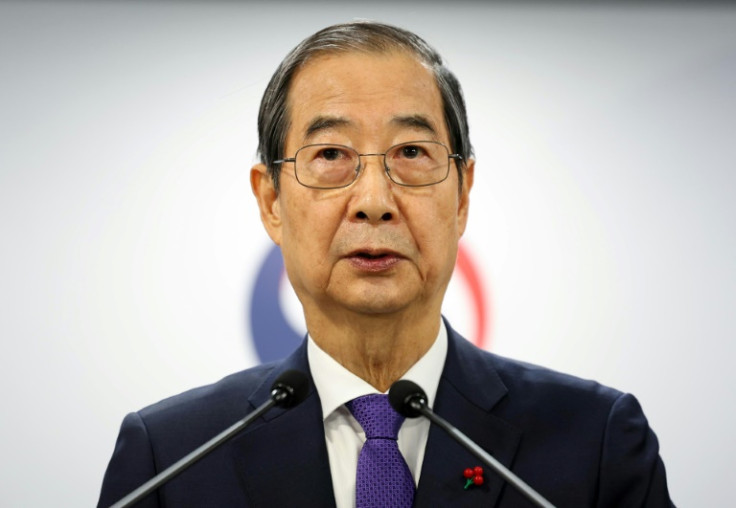South Korean Lawmakers Impeach Acting President Han Duck-soo

South Korean lawmakers impeached the acting president on Friday, as the country struggles to shake off political turmoil sparked by his predecessor's martial law declaration that shocked the world.
Han Duck-soo took over as acting president from President Yoon Suk Yeol, who was suspended following a parliamentary vote over his move to impose martial law on December 3.
However, opposition MPs demanded Han, who is also prime minister, be removed from office as well, arguing that he had refused demands to complete Yoon's impeachment process and to bring him to justice.
"I announce that Prime Minister Han Duck-soo's impeachment motion has passed. Out of the 192 lawmakers who voted, 192 voted to impeach," said National Assembly Speaker Woo Won-shik.
Counting for the impeachment was delayed as ruling People's Power Party (PPP) lawmakers protested in parliament after Woo said only a simple majority was needed in the 300-member parliament to proceed with the impeachment.
PPP lawmakers began chanting angrily and many rushed towards Woo, demanding that he resign. They did not take part in the vote.
It became the second impeachment of a South Korean head of state in just two weeks, adding to the turmoil of the country's dynamic political landscape.
It was also South Korea's first impeachment of an acting president.
PPP leader Kweon Seong-dong said after the vote that Han "must continue to lead state affairs without yielding to the opposition's passage of the impeachment motion".
However, Han said in a statement after the vote that he "respects the parliament's decision" and would wait for the Constitutional Court's subsequent decision whether to uphold it.
The opposition said in its impeachment motion that Han was "intentionally avoiding the special investigation to probe those involved in the insurrection and has clearly stated his intention to reject the appointments of three Constitutional Court judges".
Such actions, it said, were "in violation of a public official's duty to uphold the law... and serve the public".
Finance Minister Choi Sang-mok will step in as acting president in Han's place.
Choi had pleaded with the opposition lawmakers not to go ahead with the motion.
"An impeachment motion against the acting authority is no different from an impeachment motion against the entire cabinet," he told a news conference with other cabinet members earlier on Friday.
"Our economy and people's livelihoods, which are walking on thin ice in a national emergency, cannot bear the expansion of political uncertainty surrounding the acting authority," he said.
At the heart of the current row is the composition of the Constitutional Court, which will decide whether to uphold parliament's decision to impeach Yoon and now Han.
The court is currently short of three judges. While it can go ahead with its six members on the bench, a single dissenting vote would reinstate Yoon.
The opposition wanted Han to approve three more nominees to fill the nine-member bench, which he had refused to do, leaving both sides in deadlock.
Han's refusal to formally appoint the three judges "revealed his true colours", said Democratic Party lawmaker Jo Seoung-lae.
The refusal "is a direct challenge to the Constitution and the law", said Jo. They sought to impeach Han to "restore constitutional order and stabilise state affairs".
Han had said he wanted his PPP and the opposition to reach a compromise on the nominees.
"The consistent principle embedded in our constitution and laws is to refrain from exercising significant exclusive presidential powers, including the appointment of constitutional institutions," Han argued.
"A consensus between the ruling and opposition parties in the National Assembly, representing the people, must first be reached," the 75-year-old career bureaucrat said.
The Constitutional Court held its first preliminary hearing on the validity of Yoon's impeachment on Friday despite the latest controversy.
Yoon's legal team said they would attend a preparatory hearing of the court's impeachment trial at 2:00 pm (0500 GMT).
The South Korean won plummeted to 1480.2 per US dollar on Friday morning, marking its lowest level in nearly 16 years.
The won earlier plunged to a two-year low against the dollar after the declaration of martial law as investors, already concerned about the state of Asia's number-four economy, shunned the currency.
Police said on Friday that they had begun a raid on a presidential safe house and were collecting footage from nearby security cameras as part of the martial law probe.
© Copyright AFP 2024. All rights reserved.




















